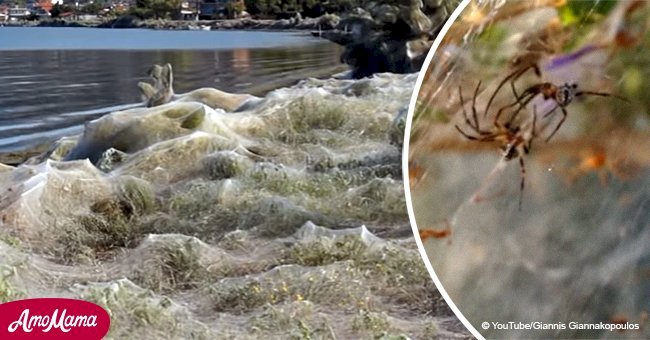
Small town slowly taken over by masses of spider webs
A town in Greece had been experiencing a strange occurrence as of late. Supposedly, their small town has been covered by webs made by thousands of spiders.
Recently, spider webs have been seen draped over plants, trees, and boats right along the lagoon in a Greece town called Aitoliko.
A small town of canals, Aitoliko is famous for being Greece’s “Little Venice,” as shared by FOX8.
The video of the spider webs creeping on the sides of the lagoon has slowly been gaining attention online.
Follow us on Twitter at AmoMama USA for more viral stories and videos.
A man named Giannis Giannakopoulos captured the strange occurrence with his camera.
He took various angles of what he called the “veil of webs” and uploaded the six-minute video on YouTube, which has almost reached a million views.
Speaking with CNN, Giannakopoulos said, “It’s natural for this area to have insects, no one is especially worried. But I have never seen any spider webs this big in my life.”
Having veils of webs draped over the town is rare, but reports revealed that the webs have appeared in various parts of the country in the past.
Arachnologist Maria Chatzaki told CNN that the kind of spider responsible for such an occurrence is the Tetragnatha genus.
It is a tiny critter with a maximum size of two centimeters.
Chatzaki explained that under the veil-like covers of webs are thousands of spiders underneath.
Greek biologist Fotis Pergantis, who is the president of the Messolonghi National Lagoon Park, explained that the spiders chose to stay in the area because of gnats.
Gnats as small-mosquito like insects that typically live for only two to three days. Surviving in hot and humid temperatures, they reportedly spend their brief life to reproduce.
Aitoliko is the ideal place for gnats reproduction, according to Pergantis.
He said, “When these temperatures last long enough, we can see a second, third and fourth generation of the gnats and end up with large amounts of their populations.”
Since gnats are abundant in the area, it is only natural for the spiders to be present.
“It’s the simple prey-predator phenomenon. It’s the ecosystem’s natural reactions and once the temperatures begin to drop and the gnat populations die out, the spider populations will decrease as well,” said Pergantis.
In the end, both the gnats and spiders impose no harm towards humans. The people of Aitoliko have nothing to worry about except clearing out those sheet-like webs.
Although, there might be an exception for the locals who are allergic to spider webs, according to The Hindu.
The media outlet shared a study from the Department of Botany at the University College of Science in Saifabad that proved the idea.
The researchers were said to have found fungal spores and pollen that are known to cause specific allergies.